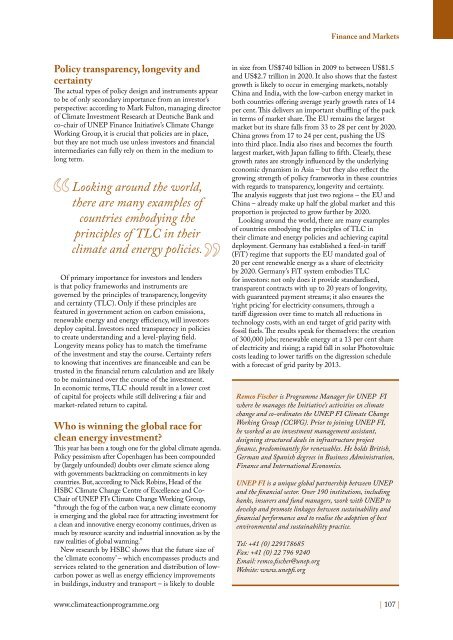Climate Action 2010-2011
You also want an ePaper? Increase the reach of your titles
YUMPU automatically turns print PDFs into web optimized ePapers that Google loves.
Finance and Markets<br />
Policy transparency, longevity and<br />
certainty<br />
The actual types of policy design and instruments appear<br />
to be of only secondary importance from an investor’s<br />
perspective: according to Mark Fulton, managing director<br />
of <strong>Climate</strong> Investment Research at Deutsche Bank and<br />
co-chair of UNEP Finance Initiative’s <strong>Climate</strong> Change<br />
Working Group, it is crucial that policies are in place,<br />
but they are not much use unless investors and financial<br />
intermediaries can fully rely on them in the medium to<br />
long term.<br />
Looking around the world,<br />
there are many examples of<br />
countries embodying the<br />
principles of TLC in their<br />
climate and energy policies.<br />
Of primary importance for investors and lenders<br />
is that policy frameworks and instruments are<br />
governed by the principles of transparency, longevity<br />
and certainty (TLC). Only if these principles are<br />
featured in government action on carbon emissions,<br />
renewable energy and energy efficiency, will investors<br />
deploy capital. Investors need transparency in policies<br />
to create understanding and a level-playing field.<br />
Longevity means policy has to match the timeframe<br />
of the investment and stay the course. Certainty refers<br />
to knowing that incentives are financeable and can be<br />
trusted in the financial return calculation and are likely<br />
to be maintained over the course of the investment.<br />
In economic terms, TLC should result in a lower cost<br />
of capital for projects while still delivering a fair and<br />
market-related return to capital.<br />
Who is winning the global race for<br />
clean energy investment?<br />
This year has been a tough one for the global climate agenda.<br />
Policy pessimism after Copenhagen has been compounded<br />
by (largely unfounded) doubts over climate science along<br />
with governments backtracking on commitments in key<br />
countries. But, according to Nick Robins, Head of the<br />
HSBC <strong>Climate</strong> Change Centre of Excellence and Co-<br />
Chair of UNEP FI’s <strong>Climate</strong> Change Working Group,<br />
“through the fog of the carbon war, a new climate economy<br />
is emerging and the global race for attracting investment for<br />
a clean and innovative energy economy continues, driven as<br />
much by resource scarcity and industrial innovation as by the<br />
raw realities of global warming.”<br />
New research by HSBC shows that the future size of<br />
the ‘climate economy’ – which encompasses products and<br />
services related to the generation and distribution of lowcarbon<br />
power as well as energy efficiency improvements<br />
in buildings, industry and transport – is likely to double<br />
in size from US$740 billion in 2009 to between US$1.5<br />
and US$2.7 trillion in 2020. It also shows that the fastest<br />
growth is likely to occur in emerging markets, notably<br />
China and India, with the low-carbon energy market in<br />
both countries offering average yearly growth rates of 14<br />
per cent. This delivers an important shuffling of the pack<br />
in terms of market share. The EU remains the largest<br />
market but its share falls from 33 to 28 per cent by 2020.<br />
China grows from 17 to 24 per cent, pushing the US<br />
into third place. India also rises and becomes the fourth<br />
largest market, with Japan falling to fifth. Clearly, these<br />
growth rates are strongly influenced by the underlying<br />
economic dynamism in Asia – but they also reflect the<br />
growing strength of policy frameworks in these countries<br />
with regards to transparency, longevity and certainty.<br />
The analysis suggests that just two regions – the EU and<br />
China – already make up half the global market and this<br />
proportion is projected to grow further by 2020.<br />
Looking around the world, there are many examples<br />
of countries embodying the principles of TLC in<br />
their climate and energy policies and achieving capital<br />
deployment. Germany has established a feed-in tariff<br />
(FiT) regime that supports the EU mandated goal of<br />
20 per cent renewable energy as a share of electricity<br />
by 2020. Germany’s FiT system embodies TLC<br />
for investors: not only does it provide standardised,<br />
transparent contracts with up to 20 years of longevity,<br />
with guaranteed payment streams; it also ensures the<br />
‘right pricing’ for electricity consumers, through a<br />
tariff digression over time to match all reductions in<br />
technology costs, with an end target of grid parity with<br />
fossil fuels. The results speak for themselves: the creation<br />
of 300,000 jobs; renewable energy at a 13 per cent share<br />
of electricity and rising; a rapid fall in solar Photovoltaic<br />
costs leading to lower tariffs on the digression schedule<br />
with a forecast of grid parity by 2013.<br />
Remco Fischer is Programme Manager for UNEP FI<br />
where he manages the Initiative’s activities on climate<br />
change and co-ordinates the UNEP FI <strong>Climate</strong> Change<br />
Working Group (CCWG). Prior to joining UNEP FI,<br />
he worked as an investment management assistant,<br />
designing structured deals in infrastructure project<br />
finance, predominantly for renewables. He holds British,<br />
German and Spanish degrees in Business Administration,<br />
Finance and International Economics.<br />
UNEP FI is a unique global partnership between UNEP<br />
and the financial sector. Over 190 institutions, including<br />
banks, insurers and fund managers, work with UNEP to<br />
develop and promote linkages between sustainability and<br />
financial performance and to realise the adoption of best<br />
environmental and sustainability practice.<br />
Tel: +41 (0) 229178685<br />
Fax: +41 (0) 22 796 9240<br />
Email: remco.fischer@unep.org<br />
Website: www.unepfi.org<br />
www.climateactionprogramme.org | 107 |












